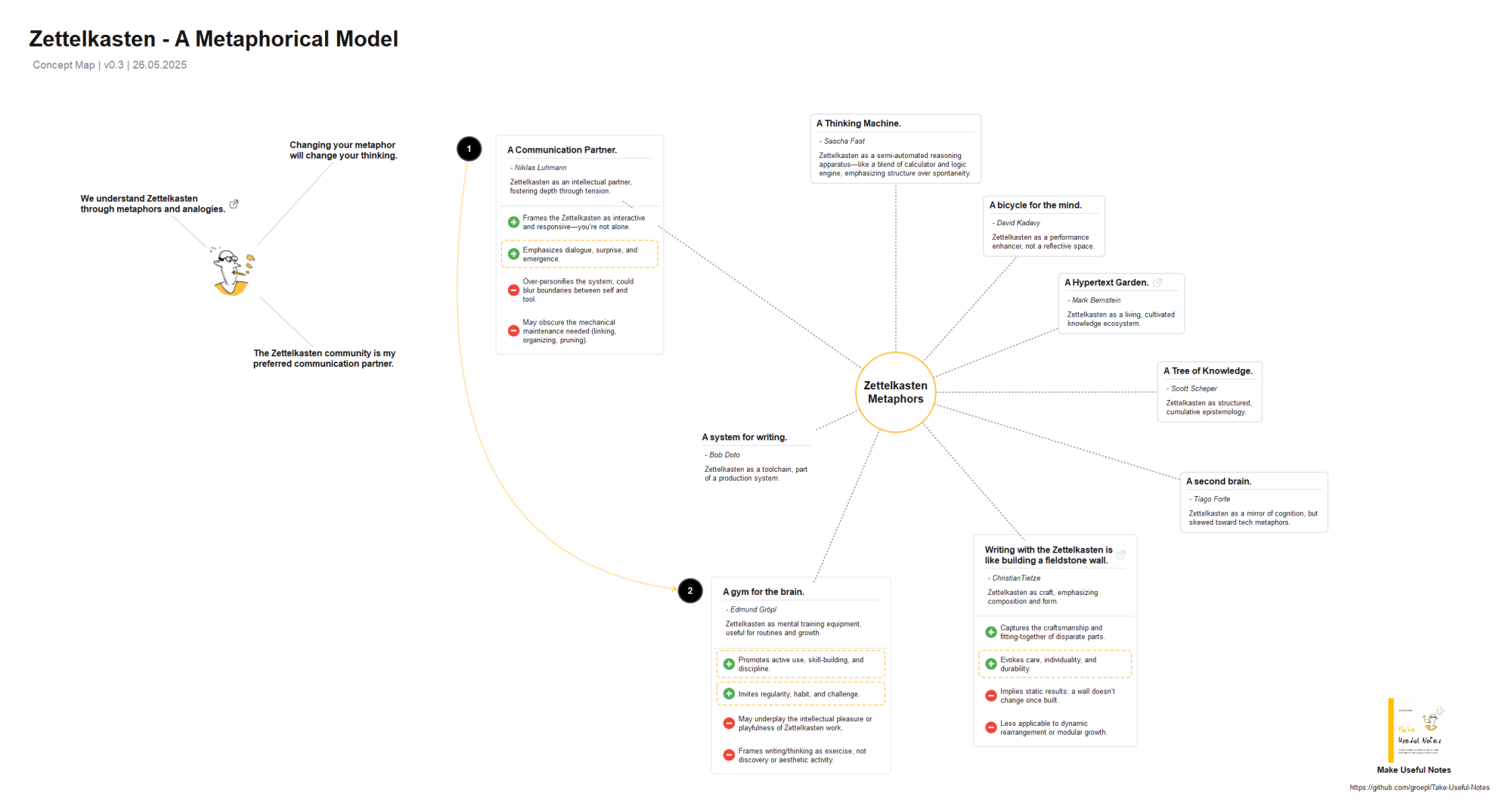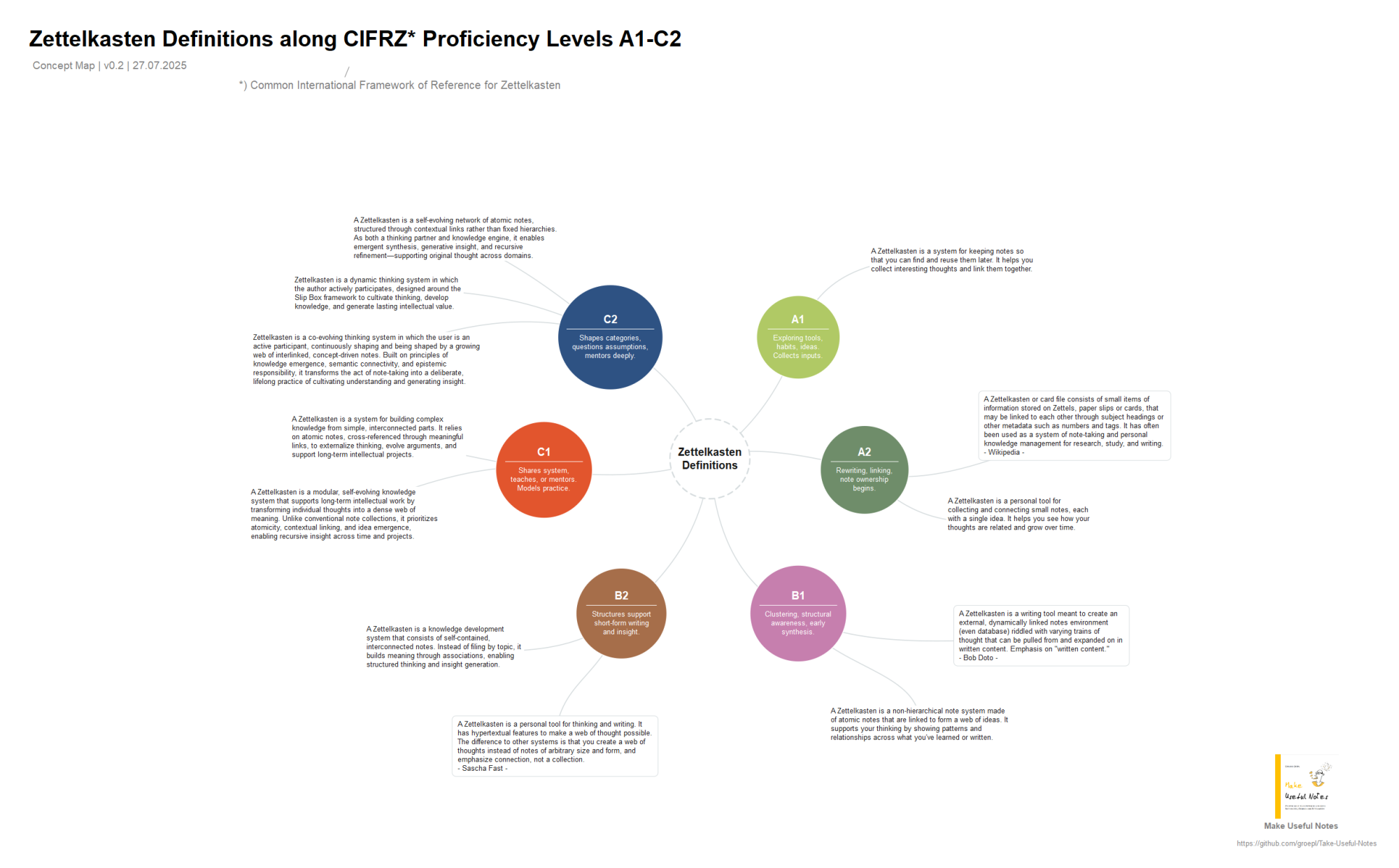The different users in your use-case model remind me of Doron Mayer's "inner workflow team" (Wayback Machine link) that I mentioned previously, where the different users are different roles that we play in a creative workflow. In other words, the creative professional, student, and project manager in your diagram are not necessarily different people!
@Andy: Thank you for sharing this link. It's a good overview. Yes, the model uses roles. One person may have different roles when using Zettelkasten. Not every role needs all use cases.
Edmund Gröpl — 100% organic thinking. Less than 5% AI-generated ideas.
A Zettelkasten can be defined within it's generalisation-specialisation structure (A is a B) and it's whole-part structure (A is part of B). Here's a new Zettelkasten model:
Zettelkasten - An Object-Oriented Model.
Zoom in and you can see the differences in detail:
A "Personal Wiki" can be defined as component of a "Personal Knowledge Management System" which can be a "Zettelkasten", a Digital Garden, the PARA Method and many others .
In this model we understand Zettelkasten through the use of metaphors and analogies. Changing the metaphor changes the way we think. I started my Zettelkasten using Luhmann's metaphor: "A Zettelkasten is a communication partner."
Today, however, I see the Zettelkasten community as my preferred communication partner. Why not change the metaphor? My latest idea: My Zettelkasten is a gym for my brain. Let's see what happens.
In this model we understand Zettelkasten through the use of metaphors and analogies. Changing the metaphor changes the way we think. I started my Zettelkasten using Luhmann's metaphor: "A Zettelkasten is a communication partner."
Today, however, I see the Zettelkasten community as my preferred communication partner. Why not change the metaphor? My latest idea: My Zettelkasten is a gym for my brain. Let's see what happens.
Tiago Forte's blog post "What do you call your second brain?" (August 2022) has some good ones too, but it's worth noting that they tend to be mind/head/brain-centered.
The gym metaphor may be more likely to lead you in a new direction if you omit the "for my brain" part, because that part makes it very similar to all the other mind/head/brain-centered metaphors, whereas if you think of it more broadly as relating to the whole body like a physical gym, then the gym metaphor could reveal something new that the other metaphors lack, perhaps.
EDIT: For example, if I call my Zettelkasten a "gym for my heart", it has different conceptual associations than "gym for my brain", and could lead to different emphases and outcomes. In terms of the MBTI model that you posted earlier in this discussion, the brain-versus-heart distinction is T versus F. Perhaps it's no surprise that someone who scores as "INFJ" (me) would point out the F alternative, as much as I aspire to apply my T skills in knowledge work.
After further consideration, I admit that calling a Zettelkasten a "gym for my heart" may sound quite ridiculous. But I submit for consideration that calling it a "gym for my brain" is equally as ridiculous, given the first lesson in Lisa Feldman Barrett's book Seven and a Half Lessons About the Brain (2020): "Your brain is not for thinking."
Thank you for reminding me at our amazing metaphor discussion three years ago.
Tiago Forte's blog post "What do you call your second brain?" (August 2022) has some good ones too, but it's worth noting that they tend to be mind/head/brain-centered.
Great link. :-)
The gym metaphor may be more likely to lead you in a new direction if you omit the "for my brain" part, because that part makes it very similar to all the other mind/head/brain-centered metaphors, whereas if you think of it more broadly as relating to the whole body like a physical gym, then the gym metaphor could reveal something new that the other metaphors lack, perhaps.
I started with the gym metaphor as an "experiment". The experience I've gained at a physical gym can easily be transferred to a mental one. However, I have no idea where this will lead.
What I learned from the metaphors in the model above:
It can be used for analysis. Why did Luhmann publish the "communication partner" metaphor? What's his personality type?
It can be used for goal setting as a metaphor for a north star goal, a long-term, aspirational goal that serves as a guiding principle providing a clear direction and focus. It's more than a specific target; it's the overarching vision that motivates and inspires, guiding daily decisions and actions.
It can be used for experiments.
Here is an updated version of the Zettelkasten Metaphorical Model:
We see that metaphors are double-edged: they reveal by mapping one domain onto another—but they also obscure by ignoring what doesn't fit the mapping.
Edmund Gröpl — 100% organic thinking. Less than 5% AI-generated ideas.
@Andy said:
But I submit for consideration that calling it a "gym for my brain" is equally as ridiculous
Yes, it is. For me, though, it's part of a mental experiment. There's no fact behind it. There's no deeper meaning. But it's a chance to produce new insights. A tool to enable creativity.
Edmund Gröpl — 100% organic thinking. Less than 5% AI-generated ideas.
The model is based on the metaphor "Zettelkasten is a gym for my brain". Here are some of the exercises I use to improve serendipitous discovery in my Zettelkasten:
Edmund Gröpl — 100% organic thinking. Less than 5% AI-generated ideas.
I believe that there is no such thing as a perfect definition. Setting a proficiency level for Zettelkasten, like CIFRZ, may help to find a definition that might be useful for the related users:
However, we need to consult our users as started by @Sascha . And we need to ask users at different levels.
Edmund Gröpl — 100% organic thinking. Less than 5% AI-generated ideas.
Comments
The different users in your use-case model remind me of Doron Mayer's "inner workflow team" (Wayback Machine link) that I mentioned previously, where the different users are different roles that we play in a creative workflow. In other words, the creative professional, student, and project manager in your diagram are not necessarily different people!
@Andy: Thank you for sharing this link. It's a good overview. Yes, the model uses roles. One person may have different roles when using Zettelkasten. Not every role needs all use cases.
Edmund Gröpl — 100% organic thinking. Less than 5% AI-generated ideas.
A Zettelkasten can be defined within it's generalisation-specialisation structure (
A is a B) and it's whole-part structure (A is part of B). Here's a new Zettelkasten model:Zettelkasten - An Object-Oriented Model.
Zoom in and you can see the differences in detail:
We may use it to compare different classes and objects like a Zettelkasten and a Personal Wiki.
In this example the model shows:
More about: Reddit
Edmund Gröpl — 100% organic thinking. Less than 5% AI-generated ideas.
@Edmund Category theory diagram next, please
Author at Zettelkasten.de • https://christiantietze.de/
Great idea. 👍
But here is the answer from my Zettelkasten:
😉
Edmund Gröpl — 100% organic thinking. Less than 5% AI-generated ideas.
What is the minimum set of atomic notes required to explain a Zettelkasten? - I'd say it's 48. What's your number?
Here's my start with seven initial notes:
One restrictive rule: Only use notes from your existing Zettelkasten.
Edmund Gröpl — 100% organic thinking. Less than 5% AI-generated ideas.
A Zettelkasten Metaphorical Model.
In this model we understand Zettelkasten through the use of metaphors and analogies. Changing the metaphor changes the way we think. I started my Zettelkasten using Luhmann's metaphor: "A Zettelkasten is a communication partner."
Today, however, I see the Zettelkasten community as my preferred communication partner. Why not change the metaphor? My latest idea: My Zettelkasten is a gym for my brain. Let's see what happens.
Also see: https://forum.zettelkasten.de/discussion/comment/23036/#Comment_23036
Edmund Gröpl — 100% organic thinking. Less than 5% AI-generated ideas.
@Edmund said:
Here's an obligatory link to an earlier discussion that @Edmund started: "What is your preferred metaphor for Zettelkasten? And why?" (April 2022)
Tiago Forte's blog post "What do you call your second brain?" (August 2022) has some good ones too, but it's worth noting that they tend to be mind/head/brain-centered.
The gym metaphor may be more likely to lead you in a new direction if you omit the "for my brain" part, because that part makes it very similar to all the other mind/head/brain-centered metaphors, whereas if you think of it more broadly as relating to the whole body like a physical gym, then the gym metaphor could reveal something new that the other metaphors lack, perhaps.
EDIT: For example, if I call my Zettelkasten a "gym for my heart", it has different conceptual associations than "gym for my brain", and could lead to different emphases and outcomes. In terms of the MBTI model that you posted earlier in this discussion, the brain-versus-heart distinction is T versus F. Perhaps it's no surprise that someone who scores as "INFJ" (me) would point out the F alternative, as much as I aspire to apply my T skills in knowledge work.
After further consideration, I admit that calling a Zettelkasten a "gym for my heart" may sound quite ridiculous. But I submit for consideration that calling it a "gym for my brain" is equally as ridiculous, given the first lesson in Lisa Feldman Barrett's book Seven and a Half Lessons About the Brain (2020): "Your brain is not for thinking."
Thank you for reminding me at our amazing metaphor discussion three years ago.
Great link. :-)
I started with the gym metaphor as an "experiment". The experience I've gained at a physical gym can easily be transferred to a mental one. However, I have no idea where this will lead.
What I learned from the metaphors in the model above:
Here is an updated version of the Zettelkasten Metaphorical Model:

We see that metaphors are double-edged: they reveal by mapping one domain onto another—but they also obscure by ignoring what doesn't fit the mapping.
Edmund Gröpl — 100% organic thinking. Less than 5% AI-generated ideas.
Yes, it is. For me, though, it's part of a mental experiment. There's no fact behind it. There's no deeper meaning. But it's a chance to produce new insights. A tool to enable creativity.
Edmund Gröpl — 100% organic thinking. Less than 5% AI-generated ideas.
Zettelkasten - A Mental Training Model
The model is based on the metaphor "Zettelkasten is a gym for my brain". Here are some of the exercises I use to improve serendipitous discovery in my Zettelkasten:
Edmund Gröpl — 100% organic thinking. Less than 5% AI-generated ideas.
Edmund, as always your diagrams are splendid and very interesting. I was wondering: are they part of an ebook you have yet to publish?
I'm sure they will be included in the book. But not all of them. Only the best ones.
Edmund Gröpl — 100% organic thinking. Less than 5% AI-generated ideas.
I have a note dedicated to collecting analogies for a zettelkasten, these are the ones I have so far:
What's your favorite?
I'm still active with my "Mental Gym Model":
Here is a first prototype for printing on cards:
Edmund Gröpl — 100% organic thinking. Less than 5% AI-generated ideas.
We are still having an ongoing discussion about the definition of Zettelkasten: https://forum.zettelkasten.de/discussion/3286/my-current-definition-of-the-zettelkasten-method
I believe that there is no such thing as a perfect definition. Setting a proficiency level for Zettelkasten, like CIFRZ, may help to find a definition that might be useful for the related users:

However, we need to consult our users as started by @Sascha . And we need to ask users at different levels.
Edmund Gröpl — 100% organic thinking. Less than 5% AI-generated ideas.